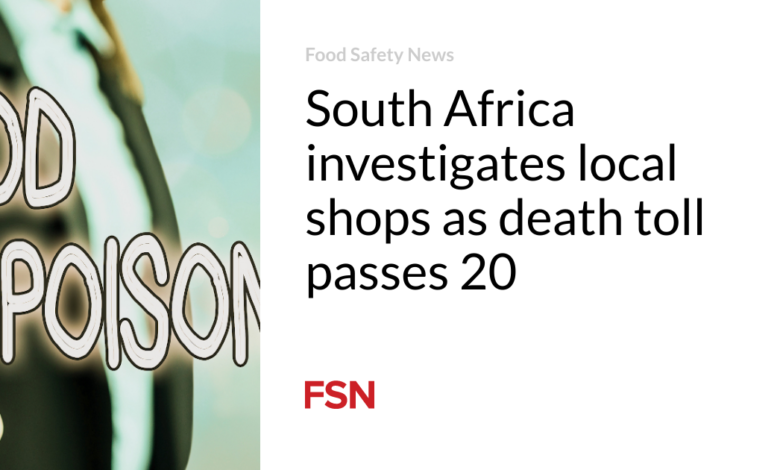South Africa investigates local shops as death toll passes 20

More than 20 people are believed to have died in one South African province after consuming food from local shops.
Gauteng Premier Panyaza Lesufi said the majority of deaths have been children aged between six and nine.
“The first uniform approach across the province was to adopt a mechanism of reporting because we have so many deaths that are taking place that we want to isolate those that are foodborne and those that need our immediate attention,” he said.
“The Department of Health has been given that task. They’ve given us their preliminary report, and in that report, they’ve indicated the deaths that have been registered thus far. We can confirm that we are at 23 [deaths], which is a sad thing.”
Action being taken
At least 441 cases of food poisoning have been reported in the province so far this year. Many incidents occurred around schools, with the rest occurring within the community.
Lesufi, members of the Executive Council, and mayors met recently to discuss the situation.
Lesufi introduced new by-laws in response to the food poisoning cases associated with spaza shops. These sites are also called tuck shops and are informal grocery stores.
“We all agreed that addressing these issues requires a comprehensive approach involving stricter regulations, better enforcement of existing laws, and increased public awareness about the potential dangers associated with purchasing from unregulated spaza shops and informal traders.”
The by-laws explain how to register a business and conduct operations. Spaza shops will also need to re-register. Food safety educational and awareness programs will be started.
Municipalities were advised to implement a strategy that includes enforcing by-laws and educating and training spaza shop owners and staff on food safety practices. This will include proper food handling, storage, and cooking techniques. Municipalities are expected to establish a system for regular inspections by local health authorities to ensure compliance with food safety regulations.
They were also tasked with launching community awareness campaigns to share knowledge about food safety, the signs of spoilage, and the process of reporting unsafe practices.
President addresses problem
Earlier this month, President Cyril Ramaphosa said the issue was being addressed “at the highest levels of government”.
“We have in the last few weeks lost several school children, who have died as a result of some chemical that has been found in the food or snacks that they have been eating and buying from spaza shops. So, this matter is being handled at the highest level, and our various departments and agencies are working around the clock.”
Ramaphosa urged parents to remain vigilant and ensure their children consume food only from trusted sources.
“I will say to us as parents, let us take care and ensure that our children only get food from places that we regard as safe places, but we will be coming out with a clear directive and direction on this matter.”
In October, Minister of Health Aaron Motsoaledi said six children from Naledi, Soweto, died of Terbufos ingestion. Terbufos is a chemical used in organophosphate insecticides to control insects and pests on some crops.
The Democratic Alliance said the tragic situation highlights the severe shortage of environmental health practitioners (EHPs) who can inspect food sold by vendors and spaza shop owners and the Department of Health’s inadequate oversight of food safety standards.
The political party called on the Department of Health to implement rigorous, unannounced inspections of vendors and spaza shops and to establish training programs for informal food handlers to minimize the risk of contamination and foodborne illnesses.
Gauteng has imposed a blanket ban on vendors who sell food around schools, but the Democratic Alliance said such a move would destroy these small businesses. It may also have the unintended consequence of making pupils purchase food, drinks, and snacks from less scrupulous, non-compliant traders.
(To sign up for a free subscription to Food Safety News, click here.)



